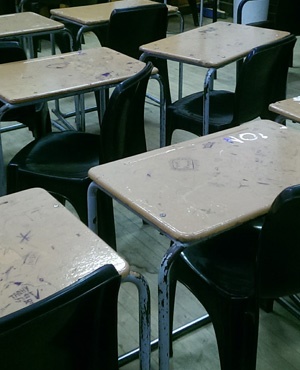
Joan Nyanyuki writes in response to a comment from Boris Johnson that education is a silver bullet, saying it is not a easy as that. She argues that there are a variety of interwoven challenges which make it impossible to have a linear, singular solution.
The recent assertion by British Prime Minister Boris Johnson that "education is the closest thing we have to a silver bullet to solve a myriad of problems," comes across as yet another substance-free soundbite from a politician failing to understand a deeply complex issue.
Mr Johnson's simplistic talk of education as a "magic potion", "panacea" and "universal cure" - made during the recent Global Education Summit - distracts from the more complex truth that there is no single solution for the challenges faced by millions of children worldwide.
Lack of education, hunger, poverty, violence and exploitation are complex, interrelated problems that require multi-faced and multi-dimensional solutions. Such challenges are interwoven, so the solutions cannot be linear and singular.
In much the same way that children do not grow up in a bubble, education does not occur in isolation. To learn, children must be well-fed, healthy, and feel safe and secure at both home and school.
Enable parents to keep children in school
Harmful practices, poverty and violence must be addressed if children are to be successfully protected from early marriages, child labour, sexual exploitation and other grave violations that hamper school attendance and learning. Parents and communities must be enabled and encouraged to keep children in school, supported by social services and economic safety net programmes tailored to their specific situation.
Of course, education is a must if children grow up to be economically active and engaged citizens of the future.
In Africa, for example - which will be home to more than one billion young people by 2050 - failure to invest in young people now will lead to a substantial economic and social burden. Yet research by my own organisation, the African Child Policy Forum (ACPF), shows the overwhelming majority of African girls and boys of primary school age do not have the required skills, knowledge and competencies expected for their age.
Two in every five African children leave primary school without learning how to read, write or do simple arithmetic. More than half of all African girls have no access to secondary school education. The Covid-19 pandemic has only served to make matters worse - at the height of the pandemic, more than 250 million children were out of school in Africa alone.
However, education alone is not the answer - indeed, there is no single solution.
Any attempt to put education at the top of a hierarchy of children's needs, or rights, will not yield the intended results.
I fully agree that education will play a critical role in addressing current and emerging problems. But to claim, as the summit did, that a lack of education lies at the root of all children's problems is to ignore the myriad of other challenges that blight their lives and threaten their survival right now.
Evidence shows that in the long term, violence against children in Africa leads to poor health, low educational attainment, increased school drop-out rates and poor job prospects. Hunger, poverty, conflict, and a host of other problems threaten children's development and future - and unless we address them with a strategic, joined-up, multi-faceted long-term approach, the recent summit's fine promises and financial pledges will be wasted.
Missed target
Despite donors pledging US$4 billion for the Global Partnership for Education (GPE), the summit - co-hosted by the UK and Kenya - failed to reach its target of US$5 billion and was roundly condemned by a succession of NGOs as a wasted opportunity.
Kenyan President Uhuru Kenyatta called on his fellow African heads of state to commit at least 20 percent of their domestic budgets to education, but the reality tells a very different story. According to 2020 figures from the Brookings Institution, African governments spend just five percent of GDP on education, and the continent currently faces an annual US$40 billion gap in education financing. Kenya itself spent a meagre 5.3 percent of GDP in 2018, a figure which has stagnated over the last seven years.
Few would argue with Mr Johnson when he told the summit, "Ensuring that all children – and especially girls – can get the education they deserve is the smartest investment we can make to ensure we build back better from the pandemic." But by putting all his eggs in the education basket, he risks - to use one of his favourite expressions - spaffing billions of dollars up against the wall.
Without concerted global action to tackle poverty, inequality, malnutrition, violence, and other injustices African children face, no investment in education will improve their life chances. Vital though it undoubtedly is, education is only one component of child wellbeing. Unless we can remove the cultural, social, economic and technological barriers to education, African children will continue to dodge that "silver bullet".
- Dr Joan Nyanyuki is the Executive Director of the African Child Policy Forum.
To receive Opinions Weekly, sign up for the newsletter here.
*Want to respond to the columnist? Send your letter or article to opinions@news24.com with your name and town or province. You are welcome to also send a profile picture. We encourage a diversity of voices and views in our readers' submissions and reserve the right not to publish any and all submissions received.
Disclaimer: News24 encourages freedom of speech and the expression of diverse views. The views of columnists published on News24 are therefore their own and do not necessarily represent the views of News24.
